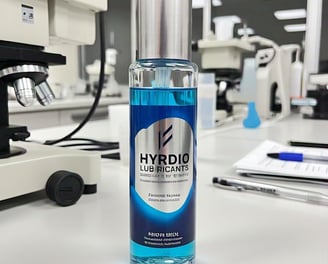Hybrid Lubricants: Composition & Benefits Overview
TYPES
Dr. D R Solanki (MBBS, CIH)
3 min read


Introduction :
Here’s a detailed overview of hybrid lubricants, covering their composition, details, pros, cons, suitability, and when to avoid them. Hybrid lubricants combine properties of water-based and silicone-based lubricants, offering a middle ground between the two.
Composition :
Water: The primary base, providing a lightweight, natural feel.
Silicone: A smaller percentage (usually 5–20%) of silicone oils like dimethicone or cyclopentasiloxane for added longevity and silkiness.
Thickeners: Glycerin, hydroxyethylcellulose, or propylene glycol to adjust texture and viscosity.
Preservatives: Parabens, phenoxyethanol, or sodium benzoate to prevent microbial growth due to the water content.
Optional Additives: Some include aloe vera, vitamin E, or pH adjusters to enhance skin compatibility or comfort.
The balance of water and silicone varies by brand, but the goal is to blend the best of both worlds.


Details :
Texture: Smooth and silky, less sticky than pure water-based lubes but lighter than pure silicone.
Appearance: Usually clear, sometimes slightly cloudy depending on additives.
Duration: Longer-lasting than water-based lubes but shorter than pure silicone; resists drying out moderately well.
Safety: Generally safe for most uses, with some caveats around materials and cleanup.
Pros (Benefits of Hybrid lube) :
Extended Duration: Outlasts water-based lubes without needing frequent reapplication, This is because of silicon.
Condom-Safe: Compatible with latex and polyisoprene condoms (unlike oil-based lubes), though check with polyurethane.
Silky Feel: Offers a luxurious, non-tacky texture that feels more premium than water-based alone.
Easier Cleanup: Less greasy than pure silicone, often rinsing off with water alone, Some time may need soap.
Versatile: Balances natural feel with durability, making it suitable for a range of activities.
Cons (Risk with Hybrid lube) :
Toy Compatibility: The silicone content may degrade silicone sex toys, but risk is lower than silicon base lube. first test and you can try.
Not Fully Waterproof: Less effective in showers or baths compared to pure silicone, as the water base dilutes.
Potential Irritation: Glycerin or preservatives in some formulas can irritate sensitive individuals or increase yeast infection risk.
Cost: Often pricier than basic water-based lubes due to the hybrid formulation.
Residue: Can leave a slight silicone coating, requiring more effort to clean than water-based options.
Best Use / When to Choose Hybrid Lubricant :
Vaginal Intercourse: Enhances comfort with a lasting glide, ideal for dryness or longer sessions.
Anal Sex: Provides more durability than water-based lubes, though not as intense as pure silicone.
Condom Use: Safe with most condoms, offering a slicker experience without compromising safety.
Moderate Toy Play: Works with non-silicone toys (e.g., glass, metal, hard plastic); test cautiously with silicone toys.
General Use: A good all-purpose option for those wanting more staying power than water-based lubes.
When to Avoid Hybrid lubricant:
Silicone Toys: Avoid or test sparingly with silicone-based toys, as even small amounts of silicone can cause degradation over time.
Water-Based Activities: Not ideal for showers or baths.
Yeast Infection Risk: Skip glycerin-heavy hybrids if prone to yeast infections, as sugar derivatives can feed candida.
Minimal Cleanup Preference: Avoid if you want something that washes off instantly with water alone.
Polyurethane Condoms: Check compatibility, as silicone traces might weaken this material.
Frequently asked questions
Q - Which lubricant avoided in water activities ?
Ans : Water, hybrid base lubricants
Q - Which lubricant require minimum cleanup ?
Ans : Water base lubricant
Q - Which lubricant high risk of infection ?
Ans : Oil, hybrid base lubricant
Post Reviewed By : Dr. Laksh Solanki on 05th April 2024
Resources
Explore educational content on sexual lubricants here.
Connect
© 2025. All rights reserved.









